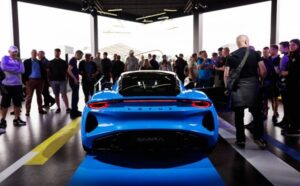We are delighted to announce that we are finalists in the 2021 AEAF animation and visual effects awards.
Author: Lauren Brady
Goodwood Festival of Speed 2021: Review
For the car enthusiasts among us, it was encouraging to see the Goodwood Festival of Speed take place after a Covid-enforced hiatus last year. The event opened its doors last Thursday as part of the UK Government’s Event Research Programme and as such could run at full capacity as far as visitors were concerned, although it definitely impacted the number of motor manufacturers in attendance.
In any case, I was very happy to be there – if only as it felt like progress on the return to normality. So, ladies and gentlemen, please fasten your seatbelts for my little round up of the highlights:
Genesis

Much like Nissan’s Infiniti and Honda’s Acura, Hyundai used the Festival of Speed to launch its Genesis brand, including the G70 Shooting Brake pictured, which is unique to these shores. It is not the easiest task in the world to break the European prestige market without any heritage as such, but Genesis seems to be including all the right ingredients in its recipe.
Ineos


Goodwood was the first opportunity to get up close and personal with Ineos’ Grenadier, fondly thought of by many as the ‘real’ replacement for the workhorse Series III Land Rover Defender. Certainly, the extremely rugged construction and serious-looking ironmongery, visible within the wheelhouses and exposed door hinges, leave us in no doubt whatsoever as to its intentions.
Pininfarina

A quick rock down to Electric Avenue and it was lovely to see the beautiful yet sustainable Battista on show and accessible to the public via the very friendly Pininfarina staff team. Just like its sister car, the recently christened Rimac Nevera, deliveries begin later on this year for those with €2m burning a hole in their ecologically sound, recycled cotton-lined pockets.
Lamborghini

Lamborghini took the opportunity to share the swansong Aventador, the Ultimae, with the appreciative Goodwood audience. Sporting a final-iteration 780PS V12, I’m sure this will fly off the shelves as we tick off yet another brand making the transition to hybrid, if not full-electric power.
McLaren

Woking’s finest continues its tradition of warm hospitality for all visitors, open chequebook or not, and welcomes you to a sit (and dream) in the stunning Elva.
The real star of the McLaren stand, however, was the new Artura, making its public debut in the UK and really looking the part. The public car was displayed in its now famous Flux Green finish but if you ask me, the car looks best off its tall show plinth and closer to the ground, to be approached as you would on the street. It’s a real testament to its design, so here’s a snap of it at the back of ‘McLaren House’ looking mean and moody in its satin paintwork:

Lotus Cars
Finally, to the storied British brand Lotus, and it’s unanimous star of the show; the new Emira. While the electric Evija still looks totally fresh as it takes its place amongst the new ‘holy trinity’ with the Pininfarina Battista and the Rimac Nevera, the sweet-as-a-nut Emira, billed as the final internal combustion-engine or ICE Lotus, saw queues around the block to have a closer look. Very well judged with even better pricing (starting at under £60k), my head and my heart are both telling me that the new £100m Lotus production facility is going to have a job on its hands to keep up with demand…
What a welcome return to an automotive event: breathe a sign of relief, everyone! EV and hybrid reveals are soon to comfortably outnumber their ICE counterparts, but it seems that the public’s enthusiasm will never be eclipsed!
REALTIME team up with Codemasters for F1 2021 ‘Braking Point’
F1® 2021 is a new next-generation racing experience launching on Friday July 16, featuring the teams, drivers and circuits for the 2021 FIA Formula One World Championship™.
In Braking Point, the brand-new story mode, players take on an epic journey, as they rise from the ranks of Formula 2™ to a shot at stardom in the world of Formula 1®. It immerses players into the glamorous world of F1®, giving a taste of the lifestyle both on and off the track: the rivalries, emotion and dedication needed to compete at the highest level.
REALTIME was tasked with creating the dramatic cinematics for the ‘Braking Point’ story mode, from emotive performances with the protagonists to edge-of-your-seat track action. The game allows the player to select a team, with distinct branding, colours and uniforms.
“F1® 2021 was our first major cinematic project where UE4 was used to replace a CPU renderer… the image quality is incredible. Even though it’s a game, the sky was the limit as to how good Codemasters wanted it to look.” Says Ian Jones, CG Director.
How F1 2021’s Devon Butler Was Made
The secret is out! We’ve been busy working on the brand-new ‘Braking Point’ story mode cinematics for Codemasters’ F1® 2021.
F1® 2021 is a new next-generation racing experience launching on Friday July 16, featuring the teams, drivers and circuits for the 2021 FIA Formula One World Championship™.
In Braking Point, the brand-new story mode, players take on an epic journey, as they rise from the ranks of Formula 2 to a shot at stardom in the world of Formula 1. It immerses players into the glamorous world of F1, giving a taste of the lifestyle both on and off the track: the rivalries, emotion and dedication needed to compete at the highest level.
Our CG Director, Ian Jones, chatted to YouTuber Matt Amys to lift the lid on how we did it:
REALTIME joins RED Production Company for new BBC Drama, Ridley Road
We’re so excited to announce that we are VFX partner on the upcoming Ridley Road, a new four-part drama series produced by RED Production Company (a STUDIOCANAL company), with Producer Betsan Morris-Evans and BAFTA-award-winning executive producer Nicola Shindler (Years and Years, Happy Valley). The series was written and adapted for television by award-winning writer Sarah Solemani (Barry, Aphrodite Fry) from the critically acclaimed novel by Jo Bloom, and was directed by Lisa Mulcahy.
Ridley Road is a thriller set against the backdrop of a swinging sixties London we haven’t seen: an East End world where far right fascism is on the rise. Inspired by the struggle of the 62 Group, a coalition of Jewish men who stood up against rising neo-Nazism in post-war Britain, Ridley Road sees a young Jewish woman, Vivien Epstein, leaving her comfortable life in Manchester and starting to work with them.
When she realises that Jack, her missing boyfriend has been badly injured, Vivien infiltrates the NSM, a neo-Nazi movement which is becoming increasingly prominent in London. And, as Vivien descends further into the fascist organisation, both her courage and loyalties are challenged.
Alongside invisible VFX work, REALTIME provided on-set supervision with our North West-based veteran VFX Supervisor Sue Land, who was supported in production by Senior Producer Fiona York and Head of Production Jane Forsyth.
Says Executive Producer, Jonathan Rawlinson, “We are thrilled to be working with a local production company in Manchester and feel very lucky to play a part in telling this story, which despite being set over 50 years ago has an important and timely message about the threat of anti-Semitism.”
The series will premiere on BBC One and PBS Masterpiece later this year.


